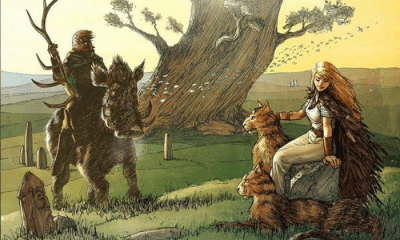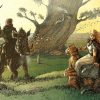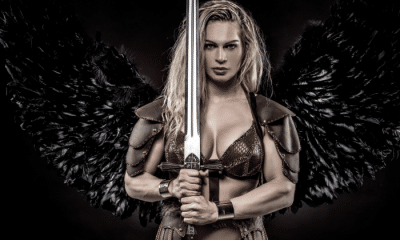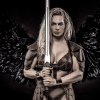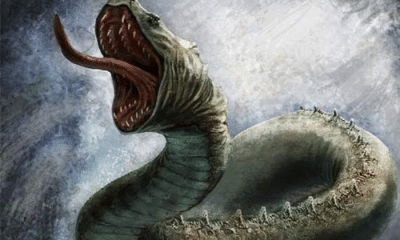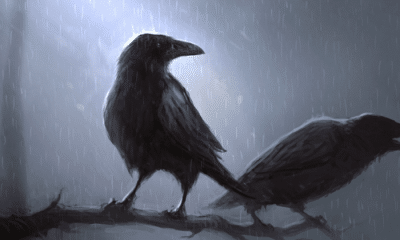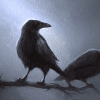Norse
Bragi – God of Poetry or Man Immortalized?
Was Bragi a God, poet, or Odin himself?
Bragi as a God has decidedly fewer mentions in Norse mythology than any of the other Gods. In some Germanic and Norse mythology sources, he is not mentioned at all.
Most of Bragi’s mentions as a deity are in the Prose Edda, written by Snorri Sturluson. Unlike the other Gods, he is not a Warrior, but a wise diplomat and caring god who helps abandoned warriors in Valhalla feel welcome and is welcomed by people in all the Nordic worlds.
Bragi Boddason was a ninth-century poet serving under kings such as Ragnar Lodbrok and is the earliest skaldic poet with verse that has survived the times and potentially Bragi as a Norse God was derived after the existence of this poet.
Many believe that Bragi is actually a facet of Odin’s personality and is, in fact, Odin himself.
Bragi – What’s he all about?
Historically, Norse people called poems “bragr.” Their poets or skalds are called bragaman or bragawomen, which is associated with the word ‘Bragi,’ as one of its meanings is ‘poetry.’ Bragi also has connotations with the word ‘bragarfull,’ which is a cup of mead that passed around the hall of Valhalla, which is significant due to the myth surrounding this colorful character.
It is thought that the modern-day word ‘brag’ has its origins from ‘bragi’ as Norse poems were often songs that honored people.
Poetry played an essential role in these times as it was the primary way of storytelling and keeping historical records and how we know anything about the Norse gods at all!
As the god of poetry and music, Bragi is considered a relatively popular deity, even though lots of sources deny his existence at all!
According to the myth, he said to be Odin’s son (the eldest next to Thor) and his mother, a giantess called Gunnlod. He is known for his creativity with words, wisdom, and the ability to tell and recite poems and songs.
Unlike the other gods, Bragi is allowed to wander freely through the Nine Worlds singing his songs of wisdom and peace, but he lives with his wife in Asgard. His wife is Iduna, who grows and gives golden apples to gods to keep them youthful. Some myths say that she carved the runes on Bragi’s tongue so he could become even more masterful with words.
Like his father Odin, he is sometimes called the “long bearded one.”
The Myth Behind the God of Poetry
Bragi came into existence, thanks to the Mead of Poetry!
Before Odin drank it, it had a long and bloody history and was made from the blood of a sacrificed Vanir King called Kvasir. Kvasir, like Bragi, was welcome everywhere, was well-loved, and peacemaker and many believed that Bragi was Kvasir reincarnated. His soul was preserved in the mead and transferred to Gunnlod’s child through Odin.
Legend has it that the Mead of Poetry was guarded by a giant called Suttung in a cave under his house. His daughter Gunnlod stayed in the cave to protect the mead.
Odin was determined to steal the mead, and after several misadventures, he got into the cave by turning himself into a snake. He then turned himself into a more handsome form and offered to be Gunnlod’s lover for three days in exchange for three sips of the mead.
After three days had passed, Odin drunk all the mead in three sips and returned to Asgard as an eagle and vomited the mead into barrels away from the giants and more harm.
Gunnlod had his child, Bragi, and sent him to live with Odin at Asgard. Bragi had a way with words, creativity, and a great singing voice, so Odin made him the Asgard’s skald.
Who was Bragi Boddason?
If Bragi’s legend was formed after the man himself, then it is a myth based on Bragi Boddason. He served notable kings Ragnor Lodbrok and Björn at Hauge as a court poet in the first half of the 9th century. He has become known as the first skaldic poet as a name that has survived history and through poems passed down the generations.
In the Prose Edda, Snorri Sturluson credits many stanzas to this Bragi Boddason, like Bragi’s Ragnarsdrápa, dedicated to legendary Viking Ragnar Ladbrok gift of a decorated shield given to Bragi.
In Gylfaginning, Snorri Sturluson wrote:
“One is called Bragi: he is renowned for wisdom, and most of all for fluency of speech and skill with words. He knows most of skaldship, and after him, skaldship is called bragr, and from his name that one is called bragr-man or -woman, who possesses eloquence surpassing others, of women or men.”
In that case, it could be the god called Bragi or the man behind the myth called Bragi Boddason.
Why do people think Odin could be the god of skalds?
Odin has a considerable array of characteristics for a one-eyed man! And one train of thought is that Bragi is a representation of some of these characteristics. They are similar in at least these four ways:
- Odin is also known as the god of poetry due to stealing and drinking the Mead of Poetry
- Knowledge of the runes also came about from drinking this elixir
- Both Odin and Bragi are known as the “long-bearded one.”
- The cult of the dead is a significant feature in both of their lives, as when a kind died, a cup of Bragi (Bragarful) was drunk in Odin’s honor.
Bragi – Human, God, or both?
Is Bragi the god of poetry and Bragi Boddason, the same entity? Perhaps upon his death, the historical poet was elevated to god status and a legend created around him. There are many similarities between the man and the god of poetry.
In Norse mythology, it is definitely not unheard of to hold deceased heroes, and potentially influencing skalds in this case, in high regard. However, the name Bragi is associated with many human historical figures, and in the case of Norse mythology, gods do not usually share their names with humans.
Other clues include that their roles in Vahalla and on earth were practically the same – for Bragi Boddason was entertaining the royal courts with poetic tales. For Bragi, the god of poetry, it was regaling departed souls with stories and comfort.
And then there is also the question of…
Shouldn’t a god also be a warrior?
Bragi is often called out on being the most cowardly of all the Norse gods and chided as being useless in battle. He is revered for his poetry and word skills but insulted at his lack of courage when it comes to fighting.
In the Viking age, it was not the job of a skald to join the battle. Their job was to tell the tales of the heroes and the gods’ adventures, which they couldn’t do if they died in battle!
But the Celts, Old Norse cousins in Europe, tackled this in the opposite way, with their God Ogma who riled up his warriors with poetic recitations and sang songs demoralizing the enemy as they ran headlong into them.
Nordic skalds, however, sang their praises of the leaders and were sent as messengers to powerful neighbors and were greeters of distinguished guests. They were chosen because of their eloquent language use and were best suited as ambassadors and diplomats, rather than on the battlefield. This role made them the equivalent of walking newspapers.
Will the real Bragi please stand up?
There was a lot of talent required to create skaldic poetry as it was strictly metered. So to talk for hours and entertain was no mean feat. So whether Bragi, the god of poetry, is based on man or myth, he deserves a prominent place in Nordic mythology and history.
In Snorri’s Skáldskaparmál, Bragi explores the mythical context to develop poetry in human society and teaches aspiring skalds the techniques and traditions that have helped us know about Nordic tradition today.
So god or elevated human, does it really matter?
Poetry played a massive role in Nordic life and is to be celebrated.


